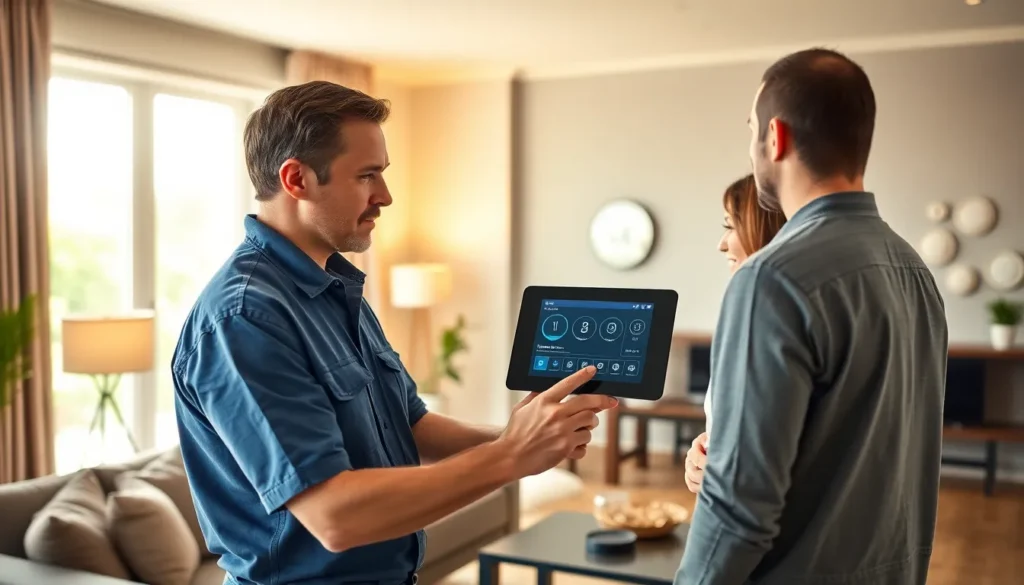Imagine waking up to the smell of freshly brewed coffee without even lifting a finger. Sounds like magic, right? Welcome to the world of home automation, where your home transforms into a personal assistant that anticipates your every need. But before you start dreaming about your robot butler, let’s talk about the real heroes behind the scenes: home automation installers.
Table of Contents
ToggleWhat Is a Home Automation Installer?
A home automation installer focuses on integrating smart technology into residential properties. They ensure that devices work seamlessly together, creating a cohesive system. This professional assesses clients’ needs, recommending solutions that enhance convenience and security.
Installation involves multiple components, including smart lighting, thermostats, and home security systems. Installers configure and fine-tune these systems, ensuring optimal performance. Familiarity with various technologies is essential, as each home may require different setups.
After installation, an installer often provides training on system operation. Teaching clients about features maximizes user engagement and satisfaction. Troubleshooting skills also play a crucial role, as issues may arise with equipment or configurations.
Home automation installers collaborate with other professionals, such as electricians or architects. Communication improves project timelines and outcomes, ensuring all components work together seamlessly. Knowledge of building codes and best practices helps them avoid potential pitfalls during installation.
Choosing an experienced home automation installer leads to a successful smart home transformation. Their expertise guarantees that technology functions as intended, creating a harmonious living environment. Client reviews and referrals serve as valuable resources when selecting an installer.
Ultimately, a home automation installer helps elevate the living experience through technology. This specialization allows homeowners to enjoy the benefits of modern conveniences while feeling secure in their home’s functionality.
Benefits of Hiring a Home Automation Installer

Hiring a home automation installer brings significant advantages that enhance living environments. These professionals streamline the integration of smart technology, making everyday tasks simpler and more efficient.
Enhanced Convenience
Convenience increases substantially with the help of a home automation installer. These experts customize systems to fit individual lifestyles, allowing users to control lighting, temperature, and entertainment with a single device. Automation reduces the need for manual adjustments, enabling routines to be effortlessly set. Homeowners experience a seamless transition between devices, thanks to precise programming and integration. Streamlined operations lead to time savings, allowing residents to focus on more important activities. The convenience of remote access ensures homeowners can manage their smart systems from anywhere, providing ultimate flexibility.
Increased Security
Home automation installers bolster home security through smart technology integration. Customized security systems provide alerts for unusual activities, enhancing homeowners’ peace of mind. Installers can connect security cameras, motion sensors, and alarms, creating a comprehensive protection strategy. With remote monitoring capabilities, homeowners stay informed about their property’s status at all times. Many systems allow for automated lighting to deter potential intruders, further increasing safety. The ability to review surveillance footage from mobile devices offers an additional layer of reassurance. These enhancements work together to create a secure living environment.
What to Look for in a Home Automation Installer
Choosing the right home automation installer is vital for ensuring a smooth transition to smart living. Factors like experience, qualifications, and client feedback play a key role in this decision.
Experience and Qualifications
Experience significantly impacts an installer’s ability to handle diverse systems. Look for professionals with several years in the home automation field to guarantee expertise. Qualifications matter, too; installers should hold relevant certifications indicating they understand the latest technology trends and safety standards. Additionally, practical experience with various devices ensures they can meet specific needs effectively. It’s crucial to confirm that they possess a strong background in wiring and installation methods, as this knowledge prevents issues during the integration of technology.
Customer Reviews and Testimonials
Customer reviews provide valuable insights into the performance of an installer. Positive feedback from previous clients indicates reliability and professionalism. Checking testimonials helps gauge satisfaction, enabling potential customers to assess the installer’s communication skills and craftsmanship. Seek out reviews across multiple platforms to get a comprehensive view of their reputation. High ratings often suggest a commitment to quality service and the ability to troubleshoot effectively. Considering this feedback ensures informed decisions about which installer can best transform a home into a smart living environment.
The Home Automation Installation Process
The home automation installation process involves several key steps, ensuring a smooth transition to a connected living environment. Each stage focuses on specific aspects to create an efficient and user-friendly system.
Initial Consultation
During an initial consultation, the installer assesses the home and discusses user preferences. Clients articulate their needs regarding convenience, security, and entertainment. Installers analyze existing infrastructure, identifying any necessary upgrades to accommodate smart technology. By gathering this information, they tailor solutions that meet individual requirements.
System Design and Planning
System design and planning follow the consultation phase. Installers create a customized layout that integrates devices seamlessly. Consideration of device compatibility and connectivity ensures a cohesive system. They outline installation timelines and budget estimates, providing clients with a clear understanding of the project’s scope. This stage emphasizes functionality and user experience, guiding homeowners toward an optimal smart setup.
Installation and Setup
Installation and setup bring the planned system to life. Professionals manage the physical installation of devices like smart lights, thermostats, and security cameras. Attention to detail ensures each component functions correctly within the system. After setup, they conduct thorough testing to verify operational efficiency. User training follows, equipping clients with the knowledge to navigate their new smart home seamlessly.
Tips for Selecting the Right Home Automation Installer
Identifying the right home automation installer significantly influences the success of a smart home project. Look for installers with substantial experience in the industry. Expertise ensures they can effectively integrate various systems while adhering to safety guidelines.
Prioritize installers who possess relevant certifications. Qualified professionals are more likely to be familiar with the latest technologies and installation best practices. Evaluate customer feedback through online reviews. Positive testimonials reflect clients’ satisfaction and highlight the installer’s reliability.
Consider asking for references from past projects. Speaking directly with former clients provides insights into the installer’s work quality and effectiveness. Assess the range of services they offer. A comprehensive service portfolio indicates versatility in handling different aspects of home automation.
Seek installers who engage in ongoing education. Continuous learning demonstrates a commitment to staying current with industry advancements. Review installation warranties and customer support options. Quality service often includes post-installation assistance and troubleshooting.
Discuss project timelines with potential installers. Clear communication about expectations helps in ensuring timely completion of the project. Confirm that they collaborate with other professionals, such as electricians and architects. Unity among team members contributes to cohesive and efficient project execution.
Examine their understanding of local building codes. Adherence to regulations ensures the installation process remains compliant and avoids future complications. After gathering this information, homeowners can confidently choose an installer who meets specific needs and enhances the overall smart home experience.
Investing in a home automation installer can transform a living space into a smart haven. With their expertise in integrating technology and understanding client needs, they ensure a seamless experience that enhances comfort and security. Homeowners benefit from customized solutions tailored to their lifestyles while enjoying the convenience of controlling various systems from a single device.
Choosing the right installer is vital for achieving optimal results. By prioritizing experience, qualifications, and customer feedback, homeowners can make informed decisions that lead to successful smart home implementations. Ultimately, a skilled home automation installer not only simplifies daily tasks but also elevates the overall living experience, making modern conveniences accessible and secure.



